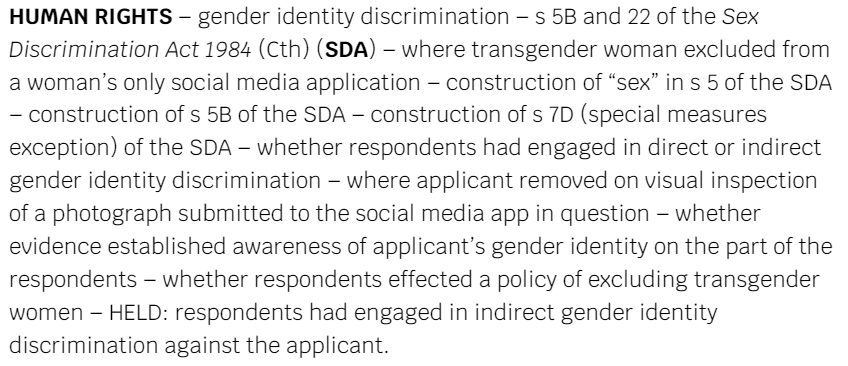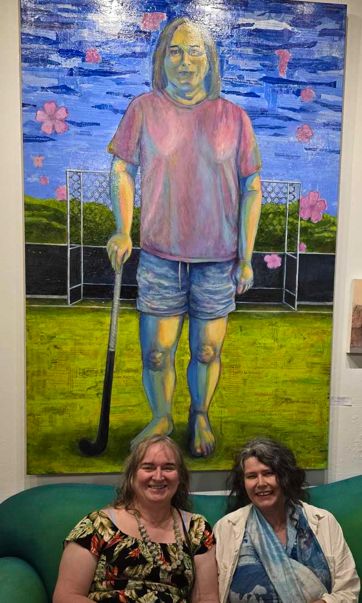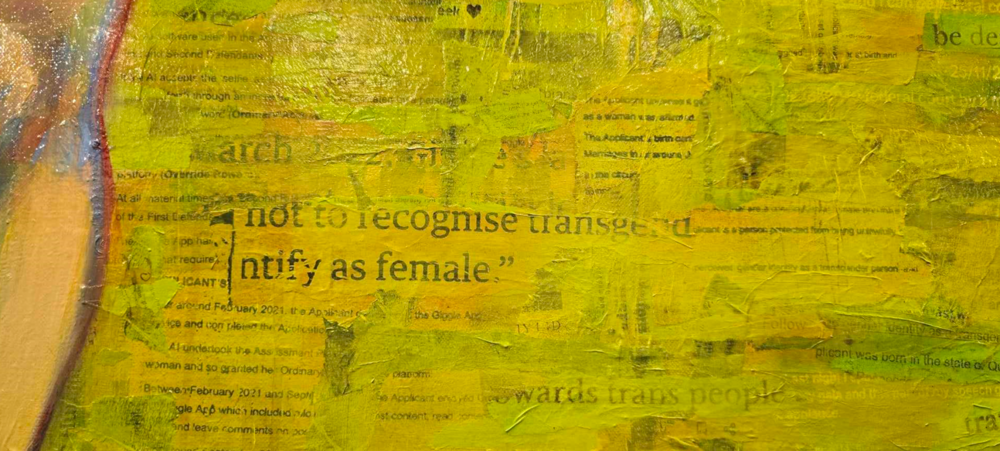Tickle Vs Giggle - Local trans woman Roxy Tickle wins her human rights case
Lara Leahy
11 September 2024, 8:00 PM
 Roxy Tickle in person, and her Archibald portrait by Lisa Bristow
Roxy Tickle in person, and her Archibald portrait by Lisa BristowRoxanne Tickle is a transgender woman who has been fighting in court for her right to legally be defined as a woman. Roxy has won the Human Rights court case.
Roxy, was discriminated against by an online app, Giggle for Girls, purported to be for women only. This case has attracted global attention as it is thought to be the first of its kind around the world. It also brought a lot of negative sentiment.
Looking back at the outcome, Roxy says, ”It was great that the judgment was in my favour, but one of the other things that I liked so much about it was that his honour said that Roxanne Tickle is a woman and deserves to use female pronouns.
“It's now law. It's not an opinion.”
Two and a half years ago, Roxy lodged a Human Rights Commission complaint.
“I joined a female only social media app, and I was allowed onto the app. They used software with a selfie mechanism. You would take a selfie of yourself, and the AI sitting behind the app would look at your face and decide whether you're male or female.”
The AI gave Roxy access to the app. She used it for a while, “but then after about six months, I realised that I had limited functionality, so I reached out to the app owner, who, it turns out, doesn't believe that trans women are women.
“She kicked me out. I tried to contact her about it, and she refused contact and blocked me. So, I lodged a Human Rights Commission complaint.
“The federal court judgment, two weeks ago, said in no uncertain terms that I am a woman and that I do not deserve to be discriminated against.”
Roxy had withdrawn from normal life in the period before she decided to transition. The transition took almost three years; then she had her gender affirmation surgery.
“Then Covid hit, then the floods and then my court case issue.”
It’s been many years since Roxy’s life could be described as “normal”, and following the court decision, “I was very numb. I still don't think that. Two weeks later, I've really kind of caught up on it.
“For nearly three years, I slept, ate, worked, played hockey and worked on the case, I've basically lost three years of my life because of this, but I felt it was a really important thing to do.”

(The official court findings. The documentation associated with this case has been made available to the public because of the attention the case has generated)
Roxy explains her background.
“When I was born, I had a birth certificate issued in my previous name; it had an M for male on there. For me personally, transgender just means that I knew from a really early age that it didn't represent who I was.
“Because of a bunch of circumstances where I was born, when I was born, it was very difficult to do anything about it. So, once I finally couldn't deal with that pressure anymore, I did something about it.
“When I grew up in the 70s and 80s in country New South Wales, the only trans people were dead sex workers on TV or in movies.”
There were no role models or examples, just inklings. Roxy was about 12 or 13 when she solidifies a memory of being in a body where she didn't feel matched with who she was.
Roxy made headlines four years ago for helping write the national guidelines for non-cisgender people in hockey.
“I helped Hockey Australia write their trans and gender diverse inclusion guidelines, and that was my introduction to people thinking that they knew who I was.
“They started attacking me online, and I thought I'd be able to sit back and just live my life. There's a noisy minority of people who want trans and gender-diverse people to go back into the closet and pretend to be cisgender again, and that's not going to happen.
“I get accused of being a danger to women and children. I won't go into the details of what's said, but that's basically pretty horrific.”
The hate is tangible. When I met Roxy, she was with friend and ally Lisa Bristow. A local artist, who had painted Roxy’s portrait for the Archibald Prize.
The artwork is a collage of negative press and posts about Roxy, painted over with her likeness in “hockey mode”.
Lisa speaks up and says, “Actually, and I've seen the diatribe. It's disturbing, and it's horrific. There is a projection upon Roxy that is not real and true to her person.
“Seeing JK Rowlings nasty tweet that sat at the top of her x post about Roxy for a week.

(Roxy Tickle and Lisa Bristow with the Archibald portait)
“Martina Navratilova, seeing her own battle with her sexuality, you think, there's someone that's a hero to look up to. She's a tennis star. She's a lesbian. She's fighting for her own rights.
“She is a hero for so many people who do not identify with traditional roles, and to see her attacking Roxy and posting about Roxy is shocking.
“They're using their fame and platforms to spread these values, which are so harmful.”
Going over the negative aspects of what Roxy has been through, she remarks, “I really wish that I could just be invisible.”
Tickle vs Giggle is such a lighthearted name for an emotionally sensitive case. Roxy defends her name.
“Tickle was my birth name. It's a really old English surname, over a thousand years old.”
Lisa elaborates, “One of the huge things that you see in those online theories, is just around Roxy's name being a porn name.”
Roxy confirms, “Once or twice a week, there'll be someone that attacks me about how I have a porn star name.
“It's actually very common. There's a Roxanne Tickle that lives in Macksville. And I'm not even the only North Coast Roxanne Tickle.”
Dealing with all these negative sentiments, Roxy says, “I need to disassociate to a certain extent. Some people put themselves in the public sphere or spotlight because they become a movie star or a politician.
“All I did was choose to stand up for myself, and for that, I get attacked by people all around the world, some really, quite well-known people who should know better.

(The collage of negative press that made up the canvas for Roxy's portrait)
“I got included in a mocking cartoon by Pauline Hanson. The number of people who have hammered me online over the last three years is more ridiculous. They need to grow up.”
Roxy has won, but the time cost has been significant. “I've been so flat out for the last six years I don't know who I am. I'm only two weeks past judgment, and I am going to take some time to try and work out who I am and what I do from now on. It's like I'm beginning life again.
Roxy believes there is going to be an appeal from the respondent, “So it's not quite over for me, yet, legally wise, but hopefully, by the end of the year, I'll be able to work out how I'm going to live the rest of my life. It's been really tough emotionally.”
This experience has had an unexpected upside: “It's made me realise how much braver I am than I thought I was. I don't think if someone had told me four years ago that I was going to do this and change so many people's lives for the better, I would have laughed at them.
“I was someone who sat in the corner at everything. Was so scared of everything, but it turns out I'm not. Turns out that I can push back against people if they try and bully me.”
Throughout this process Roxy has had a lot of support from friends and family and people like Lisa. To them, Roxy says, “Thank you. Thank you. It's been a hell of a ride, and I'm glad it's nearly over. Thank you from the bottom of my heart.”
To those who have made this journey more difficult, Roxy says, “I hope that one day they understand that not all human beings are like they thought. We're all different. We don't just have different personalities, we have completely different makeups in our brain, and trans and gender-diverse people are trying to live their lives. Meet us. Don't hate us.”
PUBS & CLUBS

